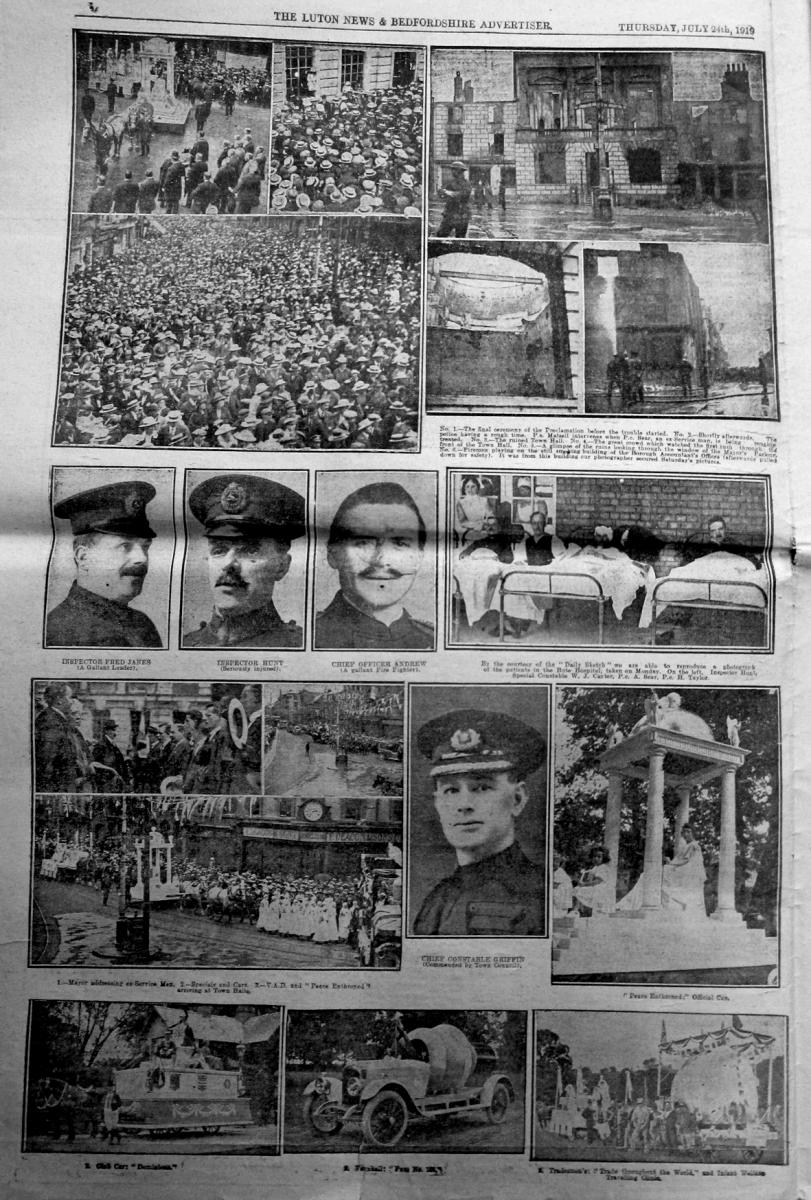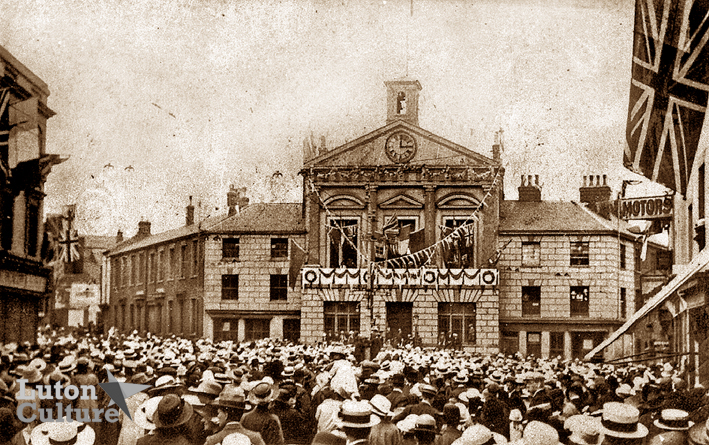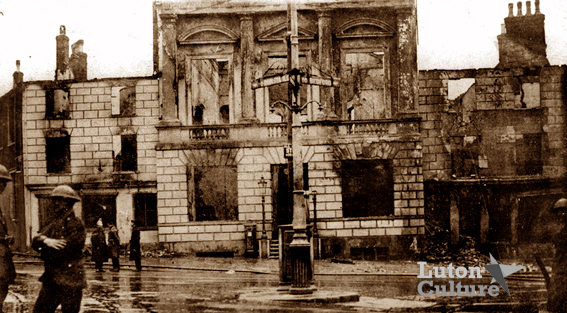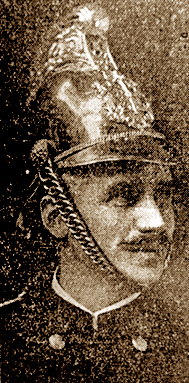
[From The Luton News: Thursday, July 24th, 1919]
There is probably now no city in the civilized world which is unacquainted with the terrible scenes of rioting and pillage which disfigured the name and record of Luton and turned the town’s Peace Celebrations into a bitter mockery on Saturday night [19th July]. In the result the Town Hall and municipal offices are a mass of ruins, and the scorched and blackened scene presented to the public gaze in the early hours of Sunday morning will remain indelibly imprinted on all Lutonians. The premises of innocent shopkeepers were smashed and looted; the police, special constabulary and the fire brigade subjected to an attack ferocious in the extreme; and damage which under no circumstances can be less than £200,000 has been caused.
Dissatisfaction known to exist in the town on many matters connected with the celebration culminated in such scenes as to necessitate the employment of military aid early on Sunday morning, and of very powerful police reinforcements subsequently, the men being drawn from the Metropolis, and neighbouring counties. The grim and disastrous story is related in detail below.
The first sign that there was likelihood of trouble was when the procession reached the Town Hall. A detachment representing the Comrades of the Great War was heading the column and a halt was called in front of the Town Hall.
The Mayor [Councillor Henry Impey], wearing his robes and chain of office, came to the edge of the pavement and proceeded to read the King’s Peace Proclamation and briefly to address the discharged men. His appearance was the signal for a hostile demonstration on the part of the crowd, cheering turned into jeering. The attitude of the crowd a little later assumed a distinctly ugly character, and as a precautionary measure, Police Sgt Matsell and three constables took up a position on the steps.
 There were loud cries for the Mayor, and a section of the spectators advanced and demanded that his Worship and the Town Clerk should come to the front and give explanations of the Corporation’s decision in regard to Wardown. The request was not acceded to, and a move was made in the direction of the doors.
There were loud cries for the Mayor, and a section of the spectators advanced and demanded that his Worship and the Town Clerk should come to the front and give explanations of the Corporation’s decision in regard to Wardown. The request was not acceded to, and a move was made in the direction of the doors.
For quite a time Sgt Matsell and his police colleagues, though hustled considerably held their ground. Finally - overpowered by sheer weight of numbers - the police were rushed and the doors forced open. The object of the crowd which streamed into the building seemed to be the Assembly Room, in which Monday night's banquet was to be held. They swarmed upstairs, and found a table or two set out for tea, presumably for the civic party.
Immediately they commenced to wreck the furniture, and a suggestion was made that the whole of the tables and chairs should be thrown through the windows into the street. Chairs were pitched on to the pavement below, some windows being broken in the process, whilst a missile of some kind was hurled through one of the windows in the Town Clerk's office.
At this point the police exhorted the men to remember that innocent women and children were in the crowd below, who stood a serious risk of injury if the furniture were thrown out. Intruders then got on to the balcony and proceeded to tear down all the bunting and decorations, as well as the framework of the electrical illumination scheme erected the previous day.
An urgent message had been sent to Wardown for police reinforcements, and the arrival of the Chief Constable [Mr Charles Griffin] and other mounted men, and Insp F. Janes and a party in a motor-car, was the first intimation to many people in New Bedford Road and Manchester Street that anything untoward was occurring. The 20 specials who had formed part of the procession were also marched back to the Town Hall by Deputy Chief Constable Robinson. The police eventually cleared the Town Hall, and after the wreckage of chairs and bunting etc, had been carried inside, the doors were again barred.
Several members of the crowd, including a crippled ex-soldier, then mounted the Town Hall steps and impassioned speeches were made, grievances regarding pensions and other matters affecting discharged and disabled men being ventilated.
Excitement gradually simmered down, and apparently not knowing if the Mayor had left the Town Hall, a large crowd marched to his private residence in London-road. Report has it that the Chief Constable showed the greatest tact in a trying situation; that he succeeded in getting the ear of the men and asked them to nominate a leader. This they did, but on inquiry found that his Worship had not arrived home, and accordingly they took the advice of the police and dispersed.
During the late afternoon and early evening, a revival of trouble being feared, efforts were made by the local authorities to enlist police aid from London, but without avail. Between 10 and 11 pm a large and determined mob arrived to swell the already congested Town Hall approaches, armed with bricks, hammers and other weapons. Though there was a good deal of noise, no real attempt at damage appears to have been made until the lighting of the giant Dover flares at each end of the town - People's Park, Hart Hill, London-road, and the back of the Downs - lit the whole district as though it were day.
 Immediately, as though by pre-arranged signal, a fusillade of bricks and other missiles was rained upon the Town Hall, and the windows were smashed with great rapidity. Rushes were made for the building, but the entrance was barred by the police. Several efforts were made to fire the Town Hall, but as and when they occurred were dealt with by the police inside the building. The doors and windows of the Food Office, on the Manchester Street corner, were completely wrecked, but Inspector Janes and his comrades repeatedly ejected from the room men who had gained entry and were endeavouring to fire the place. In the end, baton charges had to be made to drive the crowd back some distance. Shortly after midnight, by the aid of the petrol referred to, the fire was actually started and rapidly assumed most serious proportions.
Immediately, as though by pre-arranged signal, a fusillade of bricks and other missiles was rained upon the Town Hall, and the windows were smashed with great rapidity. Rushes were made for the building, but the entrance was barred by the police. Several efforts were made to fire the Town Hall, but as and when they occurred were dealt with by the police inside the building. The doors and windows of the Food Office, on the Manchester Street corner, were completely wrecked, but Inspector Janes and his comrades repeatedly ejected from the room men who had gained entry and were endeavouring to fire the place. In the end, baton charges had to be made to drive the crowd back some distance. Shortly after midnight, by the aid of the petrol referred to, the fire was actually started and rapidly assumed most serious proportions.
The Fire Brigade arrived on the scene via Guildford Street, but were immediately surrounded by the hostile elements and were prevented from attacking the flames owing to the fact that their hose pipes were severed in all directions and the two men accompanying Chief Officer Andrew were immediately knocked out by the crowd.
The shop of Mr. W. S. Clark, at the corner of Wellington Street [Walter Sydney Clark, chemist, 81 George Street], had by this time been smashed in and parts of its contents looted; but mainly the ringleaders contented themselves with taking the owner's stock of glass bottles, in order to strengthen their supply of 'ammunition'.
In addition the Herts Motors garage [70 George Street] was burst open and tins of petrol were seized to feed the fire. Weakened by their long and continuous effort to maintain the property intact, and by the loss of many of their number who had been put out of action by close contact and also the rain of missiles, the police and firemen were practically powerless, and the fire got really started in the Town Clerk's department, and in the Food Office.
Men could be seen hurling into the room all sorts of inflammable material - pieces of broken window frames, doors etc. - which they could obtain; and, the outbreak once having been actually started, was fed by fireworks and petrol until it had obtained a complete hold on that corner.
The Chief Officer had by this time lost several of his men, owing to the attentions of the crowd, and he deceived the wild elements by withdrawing his motor from the scene. A rush was made to wreck the machine by damaging the radiator, and the Chief received a heavy blow, but his helmet saved him from injury. He returned to the vicinity of the Town Hall by a devious route. He got a length of hose fixed from a hydrant in Dunstable-place, but when, with the aid of special constables and civilians (among whom, we understand, were members of the Comrades of the Great War), the nozzle was run down to near the blazing building, a rush was made to collar the hose.
The attention of the crowd being concentrated on this matter, the Brigade were enabled to get a second line of hose going, the connection being made in a few seconds. It was then the rescuers commenced to get the upper hand, for with very powerful crossed jets of water, at high pressure, the firemen swept the entrance to Upper George-street in machine-gun fashion, kept back the men who tried to rush the path (several being knocked clean off their feet), and attacked the flames in earnest.
 It was apparent that the main structure was doomed, and principal attention was devoted to adjoining property. In their efforts in this direction they met with considerable success, for at one time it seemed highly probably that the whole of the block of buildings back to Gordon Street might be involved. This danger was happily averted, and the flames were prevented from spreading beyond the principal set of buildings.
It was apparent that the main structure was doomed, and principal attention was devoted to adjoining property. In their efforts in this direction they met with considerable success, for at one time it seemed highly probably that the whole of the block of buildings back to Gordon Street might be involved. This danger was happily averted, and the flames were prevented from spreading beyond the principal set of buildings.
The Food Office was completely gutted and the situation there as such that on Monday morning it was necessary to demolish the outer walls at the corner in the interests of public safety. At one time on Saturday night, before the fire had gained a firm hold, there was a big shower of coupons and other literature thrown out of the window.
From this point onwards the crowd was somewhat less bellicose in its attitude towards the fire-fighters and police, but the grim carnival was carried to extreme limits.
Messrs Farmer & Co's piano warehouse [85 George Street] was broken into and the instruments dragged into the street. To the tune of 'Keep the Home Fires Burning' the wilder elements of the huge gathering danced and sang, some even mounting a grand piano for the purpose.
All this time the Brigade maintained its attack on the blaze, the hydrants and hose being guarded by special constables, though the force was sadly depleted, owing to the number of men who had been injured and had been removed for treatment to the police station and to the Bute Hospital. Mrs Griffin [the Chief Constable's wife] and others rendered yeoman service in this direction and the motor ambulance was kept regularly employed.
TROOPS CALLED IN
About 3am a body of the Royal Field Artillery from Biscot Camp, marching eight abreast, swung down Upper George Street singing gaily as they came. At the sight of khaki the crowd seemed to fade away, and with a cordon of troops drawn round the Town Hall, Chief Officer Andrew was able to get down to the task of obtaining control of the outbreak.
The arrival of the R.F.A. was too late to prevent the damage and looting of the premises of confectioner Mr. G. Payne and boot and shoe dealers J. M. Messrs Brown & Co in Manchester Street.
Finally a section of the crowd visited the shop of Mr Carl Caspers, hairdresser, in Bute-street, and, having smashed the windows, looted the umbrellas which formed a portion of his stock; whilst a brick was thrown through a window at the shop of Mr Hermann Stern [straw hat material merchant], on the opposite side of the road.
It was five o'clock before the special constables were able to be released, and the regular police force still fit for duty remained at their posts until they could be replaced by officers drawn from outside areas.
Early on Sunday morning, a very large body of troops were marched in from Bedford and took charge of the centre of the town.
THE INJURED POLICE
 As has already been mentioned, the police casualties were very heavy, practically every member of the force sustaining some injury from the attacks of the infuriated mob. Many were attended by Dr. Archibald, the Medical Officer of Health and Police Surgeon at the Police Station, but in some instances the injuries were so serious as to necessitate the removal of the patients to the Police Station.
As has already been mentioned, the police casualties were very heavy, practically every member of the force sustaining some injury from the attacks of the infuriated mob. Many were attended by Dr. Archibald, the Medical Officer of Health and Police Surgeon at the Police Station, but in some instances the injuries were so serious as to necessitate the removal of the patients to the Police Station.
These were: - Insp Hunt (several injuries to the stomach and legs, and abrasion on the head); Pc Sear (badly cut head and lacerated ear); Pc Taylor (severe stomach injuries); Pc Silvester (severe stomach injuries); Special Constable Carter (injuries to the head). A civilian named George Fowler, of 6 Albert Terrace, was also admitted to hospital suffering from wounds on the head, which he says were due to being knocked over by the fire engine.
Constables Sear, Taylor and Silvester are all ex-Service men and the officers generally were very roughly handled. All, however, happily made quick progress under the care and attention of the hospital staff. [Pc Silvester is pictured in hospital.]
FIREMEN CASUALTIES
The attitude of the crowd towards the Fire Brigade was one which, like others connected with this disaster to the town, would be unthinkable had the people in the streets not gone mad for the time being, and lost all their reasoning powers.
 "The firemen were rendered splendid assistance," says Chief Officer Andrew [pictured, right], "by a number of discharged soldiers, serving soldiers, regular and special constables, but they were all laid out one after the other.”.
"The firemen were rendered splendid assistance," says Chief Officer Andrew [pictured, right], "by a number of discharged soldiers, serving soldiers, regular and special constables, but they were all laid out one after the other.”.
The casualty list among the firemen was as follows: -
Second Officer J. W. Plummer, hit twice on the head with an iron bar, and also hit on the head with a missile.
Foreman T. George, twice laid out with blows on the head.
G. Ireland, face and hands cut with missiles.
W. A. Pedder, internal injuries caused by a blow in the stomach.
W. Burgess, blow on the head.
W. Clarke, laid out by being deliberately struck in the back with some weapon.
S. Barber, blows on the head and back.
F. Cowley, senior, injuries to head and side.
S. Giddings and A. Day, cuts on hands.
W. G. Burgess, knocked out three times, once with a weapon, and twice with missiles.
H. Bates, twice incapacitated, and suffering from concussion.
J. Garrett, injured by blows on the hands.
A. Cook head and neck injured.
Chief Officer Andrew had his helmet damaged by a nasty lump of iron which was thrown at him, but was not injured, although he was continually used as a target for missiles. The chief officer and two firemen were the only ones who escaped personal injury.
In all the Brigade lost about twelve lengths of hose, some being cut so about as to be useless, and others dragged away by the mob. A hydrant shaft was broken, and two branches and some couplings disappeared. Some of those have since been recovered, but in a condition which renders them unfit for use. Six of the brass helmets worn by the men were also so battered as to be unserviceable.
The No. 2 motor has some dents in the bonnet, one of the headlights and a rear lamp were damaged, and the horn also received a smashing blow.

